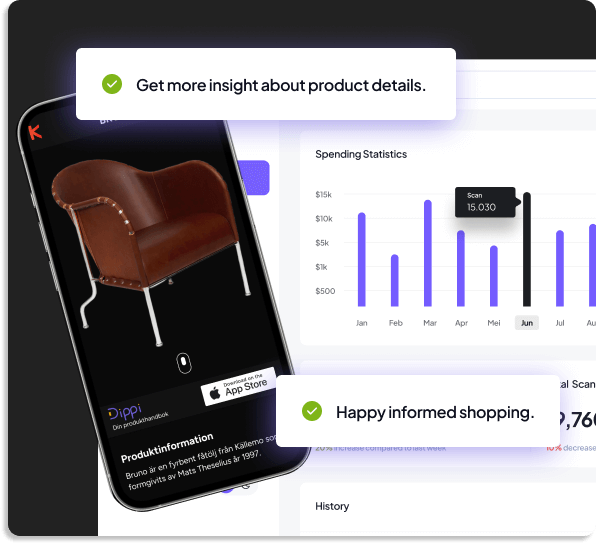Digital Product Passport
Set your company apart from the crowded market
Sustainable. Modern.
Effortlessly integrate Dippi into your existing systems.
Contact us
How we help
We are working to develop fastest and most creative way for furniture companies to join into the digital world, providing the most modern digital touchpoint for end customers and stakeholders.
Activity report
Gain and show accurate, credible and verifiable sustainability data.
Supply chain transparency
Our platform improves supply chain traceability and enriches your existing data.
Product management
Easily manage all your products in one go.
Analyze your product to guide your decision-making

Tailor your products to suit each unique customer journey, offering flexibility for individuals to navigate their preferred path.
- Increase in retention
- Customer base growth
- Environmental footprint calculations
- Impact contributions


How it works
Know more about your product.
- 1Scan QR code or NFC tag
- 2Start keeping track of your products
- 3Be more informed
Utilize robust tools to stay informed and optimize your product usage to align with your goals.
Frequently asked questions
A Digital Product Passport comprises product-specific digital data designed to render pertinent information accessible throughout the product life cycle, contributing to the advancement of Sustainable Production & Consumption. The objective of the Product Passport is to enhance traceability and promote a circular economy by enabling manufacturers to share diverse sustainability data about their products. This information may encompass details about characteristics, composition, eco-labels, origin, usage, recycling, and more.
The EU's legislative framework for DPP is projected to be determined in the spring of 2024. Following this, the EU plans to release more detailed product regulations for specific categories. The expectation is to cover 3-4 categories annually, totaling approximately 30 categories.
The anticipated regulation is set to cover all products available on the EU market, except foodstuffs, animal feed, and medical products.
The initial product-specific legislation anticipated by the European Commission is expected to encompass textiles, electrical products, batteries, and furniture.